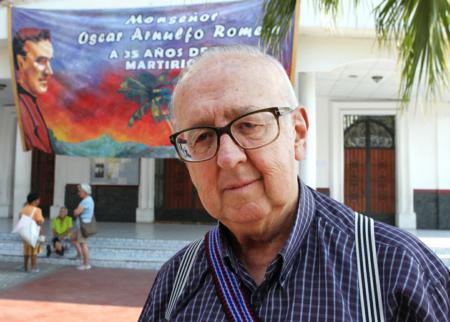Priest says archbishop a 'saint' sent by God to shine light in darkness
SAN SALVADOR, El Salvador (CNS) -- One of the pilgrims in El Salvador for Archbishop Oscar Romero's beatification was Chilean Father Pablo Richard Guzman, who has the distinction of being the author of a book that sits in the former home of the Salvadoran martyr.
The book, "The Struggle of the Gods: The Idols of the Oppression and the Search for the Liberating God," was written by Father Richard, a well-known liberation theologian in Latin America.
Was Archbishop Romero a follower of liberation theology?
"No," said Father Richard. "But he influenced us."
Back in the day, Father Richard -- along with other priests such as Dominican Father Gustavo Gutierrez, Franciscan Father Leonardo Boff, Jesuit Fathers Juan Luis Segundo, Jon Sobrino and Ignacio Ellacuria, and Father Pablo Richard -- marked the Catholic landscape in Latin America with their writings, saying that Jesus called for liberation from oppression as well as from sin.
Some liberation theologians have been criticized and rebuked by the Vatican, which saw some of them as inappropriately stepping into political ideologies such as Marxism. For example, Father Boff, a Brazilian theologian, was silenced by the church for a time in the mid-1980s because of his writings.
"It's normal that others attack us," said Father Richard, a prolific writer, who was exiled to France, and later Costa Rica, following the military dictatorship of Augusto Pinochet in his native Chile. "I've been accused of being a terrorist, a Marxist, a communist."
What he has been is one who cares deeply about the poor and the conditions they live under. That's why Archbishop Romero was a great influence to him and others, said Father Richard.
Though his death was horrific, and El Salvador was a place of great danger in Archbishop Romero's time, we have to trust that that's why God "sent a saint," he said, to shine a light in the darkness.
Archbishop Romero was "a Christian, a saint" for his defense of the poor, and of the faith, especially when innocent civilians were being slaughtered during the 12-year war.
"Anyone who opts for the poor is in danger" of dying by weapons or by the words of others, he said. But Archbishop Romero is now above that, especially with this declaration as blessed, Father Richard told Catholic News Service.
"It's a great joy," he said of the beatification. "But for me, he already is a saint."
A year before he was assassinated March 24, 1980, Archbishop Romero visited Costa Rica and met with Father Richard in April 1979. That's when Father Richard autographed the book at the archbishop's request. The following year, Father Richard visited Archbishop Romero in El Salvador. Two months later, the archbishop was assassinated and since then, Father Richard has often made the pilgrimage to visit the place where he lived and was killed.
Father Richard still lives in Costa Rica, where he works at a formation center but also feeds the poor and works with those who have AIDS or drug problems.
"I want to listen to those no one will listen to, touch those no one will touch and ultimately, I want to give them love. My parish is the street," he said.
At 75, he still writes and he seems like a cautiously fervent evangelizer. He is a biblical scholar and urges those around him to crack it open.
"Do you read the Bible?" he asked and made a joke about not using it as deodorant, "only under your arm."
He has been most inspired by those who can't read, but will learn to read later in life only to be able to read the Bible.
"I don't want to just place a Bible in a person's hand, but I also want to put the Bible in their heart and in their thoughts," he said.



















